China’s neck-snapping change in tone on Australia
Until last year Australia’s relationship with China was appalling. Now the Chinese Premier is calling our Prime Minister a ‘handsome boy’. Why is China being chummy?
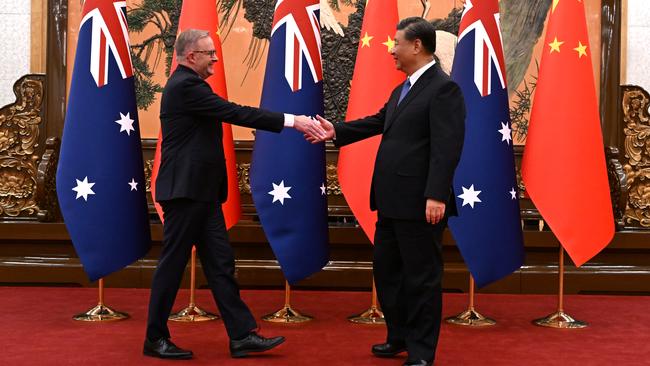
It’s startling what people in China will tell you in person about President Xi Jinping.
I was on my way to meet a senior member of Australia’s business community in China in a posh part of Shanghai. Anthony Albanese had flown out of China days earlier on his RAAF jet, closely followed by all of the two dozen members of the travelling Australian media, except for me.
I had asked my Shanghai taxi driver, as I asked nearly everyone I met on this trip, what he thought about Australia.
“If I could, I would immigrate there,” he said. “Australia, America, Singapore – any of them would be good.”
I asked him why.
He pointed his left finger straight up, as if to the heavens. “Right now, things are not good,” he said.
Then he traced an “X” in the air and said a few more coded phrases to make sure he was understood. It was a brazen answer to someone he had met only eight minutes earlier.
Xi’s control-freak government is extremely anxious about allowing foreign journalists into the country. It is not without reason; officials are petrified about what their citizens may tell us.
During the three nights the Australian media pack trailed our Prime Minister around Shanghai and Beijing, Chinese officials mostly kept their citizens well away.
“The entire place is locked down for us,” a member of Albanese’s staff said as we entered the Temple of Heaven on a crisp, blue-sky day in Beijing.
As we arrived, groups of domestic tourists were being shooed out of the imperial park to clear the grounds ahead of the morning’s re-enactment of an iconic moment on Gough Whitlam’s historic trip in 1973, the first to the People’s Republic of China by an Australian prime minister.
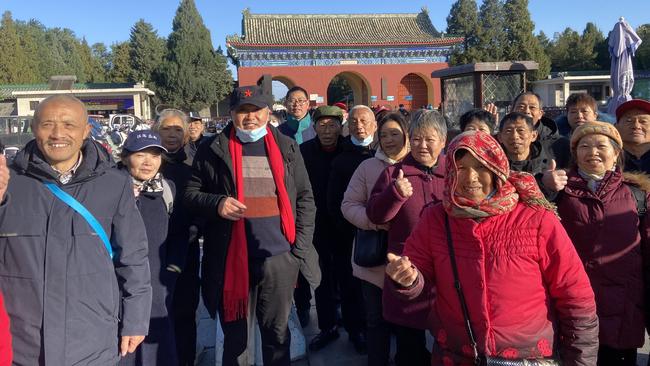
One of the departing sightseers was audibly filthy about the barbarian intrusion but most of the tour group members I spoke to were excited to see a foreigner, a rare species in China today. One did a kangaroo impersonation when I said where I was from. Another listed Australian cities: “Sydney, Melbourne, Brisbane …”
It was like that throughout my week in China. Most people couldn’t have been more welcoming when I said I was Australian.
Still, it wasn’t long before a pair of Chinese security guards were telling me that speaking to the public was not allowed.
Why is China being chummy?
Until last year, perhaps no country had a worse relationship with China than Australia. The change in tone this week has been neck-snapping.
China’s Premier Li Qiang told our Prime Minister he was a “handsome boy” in the Great Hall of the People.
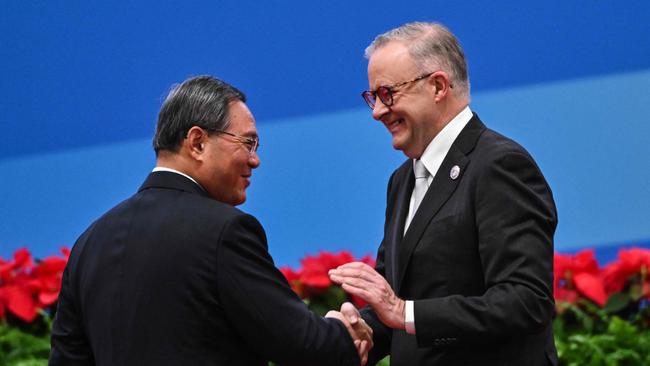
President Xi said the bilateral relationship was on “the right path” when he met Albanese in that same cavernous, Stalinist structure.
“I’m heartened to see that,” the Chairman of Everything said. He even managed a smile.
Albanese was on the front page of the Tuesday editions of the big three state media paper’s: the People’s Daily, China Daily and the Chinese language Global Times. He also was featured on CCTV’s flagship nightly news broadcast, listening to Xi and smiling.
Beijing has long declared all the fault of the bilateral breakdown lay with the “prejudiced policies pursued by Albanese’s predecessor”, as the China Daily put it in an editorial this week.
I lost count of the number of Australian business people who spoke of Scott Morrison with similar dark phrases during this week in China.
The Albanese government certainly has spoken about China with more discipline, but the change between the two is highly overstated by Beijing’s propaganda machine and a clutch of the usual suspects in Australia.
As the Prime Minister flew to the Cook Islands for the Pacific Islands Forum, I had dinner in Beijing with a well-informed Chinese observer of international affairs. I won’t name this person or any of the Chinese citizens I spoke to on this trip so they don’t get into trouble.
He laughed at a Global Times editorial that had suggested Australia and China had “met halfway”. “That’s ridiculous,” he said. “What has Australia done? Speak a bit less loudly? China has given far more ground.”
In his view, Albanese has benefited from Beijing’s recognition that its approach with Australia has been disastrous.
Coalition-era “prejudiced policies”, such as the AUKUS security agreement and elevation of the Quad, are now solidly bipartisan even as relations have warmed.
A smiling PM @AlboMP makes the front of today’s @ChinaDaily
— Will Glasgow (@wmdglasgow) November 6, 2023
The PM gets top billing in this story — but as you can see, President Xi had more than Australia on his mind as four leaders passed by on the Great Hall of the People conveyor belt (1/3) pic.twitter.com/ibBpnxXPsn
One of the saner heads in Australia’s thinned-out China-based business community said Xi’s government had overseen a spectacular about-face. “Maybe someone realised that they should stop making enemies,” he told me over a lunch of noodles.
A slowing economy seems to have deflated some of the Chinese leadership puff. Its Covid-era slogan “the East is rising and the West is declining” looks a lot less convincing.
Joe Biden also is being treated differently. Relations between the US and China are a long way from good but points of contact are growing.
In a week the US President will meet Xi in San Francisco, on the sidelines of the Asia-Pacific Economic Co-operation summit. “That will be important,” Albanese said in Shanghai.
It’s a welcome change, but its significance shouldn’t be exaggerated. During my week in China, I met a journalist at one of the country’s most jingoistic – and, not coincidentally, most popular – news websites.
He had a pithy summary of his employer’s news philosophy: find a story in the international media and rewrite it with an anti-American twist.
It has been a potent formula during the Xi era. I was told to expect it to continue after the Xi-Biden meeting in San Francisco.
A very handsome boy
Albanese’s visit to China was far bigger news in Australia than in China. Well over half of the people I spoke to didn’t know it had even happened.
If they were aware of the trip, by far the most common answer was that they had seen a video of the Australian Prime Minister talking to someone while exercising on the Bund, with Shanghai’s famous skyline in the background.
Even Premier Li brought it up at the start of their meeting on Wednesday, telling Albanese that many people in China had seen the video.
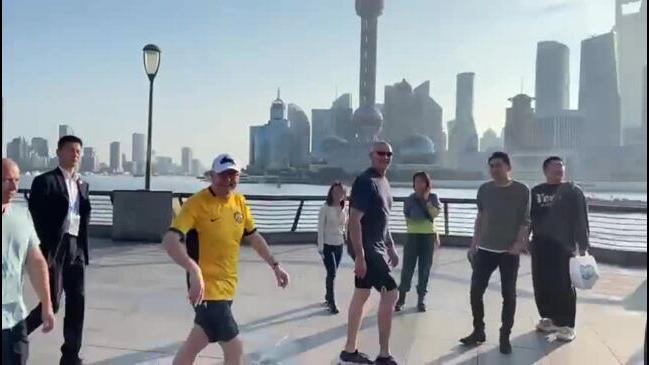
“People were saying that we have a handsome boy coming from Australia,” China’s second most senior political leader said.
Unaware that it would be embraced by Beijing’s propaganda machine, I took that footage of Albanese on my phone. I bumped into him channelling John Howard while I was out for a run and he was walking by in the Matilda’s kit and Rabbitohs cap.
I posted the video on the social media platform X. Someone copied and reposted it on to Douyin, the Chinese version of TikTok, where the video went berserk.
People in China were stunned that the leader of a country could be so relaxed. I had said hello and he had replied, an extraordinary exchange in the PRC.
“You cannot imagine a Shanghai mayor or Shanghai party secretary walking on the Bund,” someone in Shanghai told me.
“When our Premier or President travels to Shanghai, many flights are cancelled, trains are halted and the Bund is closed.”
Albanese did his best to stress the positive after his meeting with China’s supreme leader. President Xi, he said, relayed stories about his visits to Australia, including an exchange about Tasmanian devils and pandas.
“He reminded us of the fact that not all pandas are cute,” Albanese said at a press conference in Australia’s embassy in Beijing after the meeting.
He said the most powerful Communist Party leader since Mao Zedong had then spoken about the animated film Kung Fu Panda. “That shows, really, just how warm the exchange was. It was very positive.”
The chumminess set off a few national security-focused commentators, but Canberra has not lost its sense of realism about the relationship’s future.
A senior member of the government told me over Tsingtao beers at the Australian embassy in Beijing that a separate meeting earlier that day between Foreign Minister Penny Wong and Xi’s international adviser Wang Yi had traversed the many disagreements that remain.
“It’s not like: ‘You give us beef, we give you the South China Sea’,” they assured me.
Can Australia trust Beijing?
By the end of the week, I was in Xiamen, more than 2000km from Beijing. A trip on a fast train away from the country’s securitised capital is always good for perspective.
Some of the views in the southeast of China on the trip by “handsome boy” were less than favourable.
“His visit will not help the situation,” I was told by someone who sounded like a loyal reader of the Global Times, which not for nothing is the most popular newspaper in China. “Australia is just doing what America wants it to do.”
By contrast, almost every member of the Australian business community in China I spoke to was thrilled by the trip, the first by a prime minister since 2016.
Frank Li, the distributor of Bundaberg’s drinks range in China, said the enthusiastic coverage by Chinese local media of the Prime Minister’s visit was terrific, even if it was a bit scary to be on the frontline. “My footy skills came in handy,” he told me.
Li’s was one of the stands visited by the Prime Minister at Shanghai’s China International Import Expo trade show. By 2020, Bundaberg had sold more than 30 million bottles in China, mostly its bright passionfruit and pink grapefruit bottles, which photograph well for Chinese social media.
The business grew 100 times since 2016. Its success shows how the Chinese consumer was never out to punish Australia – that decision was made in Zhongnanhai.
Australia’s exports to China hit new records during Xi’s coercion campaign. That has given Canberra more confidence in dealing with its biggest and most demanding trade partner.
But some Australian businesses were pummelled, few more than Li Wei’s Swan Wine Group. It was hit with an almost 200 per cent tariff in late 2020 despite having former Australian ambassador to China Geoff Raby spruiking the brand.
In the days before the Prime Minister’s trip, Li helped bring back to China members of Australia’s 1971 table tennis delegation – whatever it takes to try to nudge Beijing to end its wine impost, which has particularly hurt Chinese-Australian businesses.
“It is necessary to maintain a stable relationship between China and Australia,” Li said.
The biggest obstacle to Australian businesses operating in China remains Beijing. The outlook is better this week, but Xi has made it clear this could change if Canberra again draws his “ire”.
It poses a dilemma for Australia’s businesses. Will they be in the crosshairs of Beijing’s next trade coercion campaign?
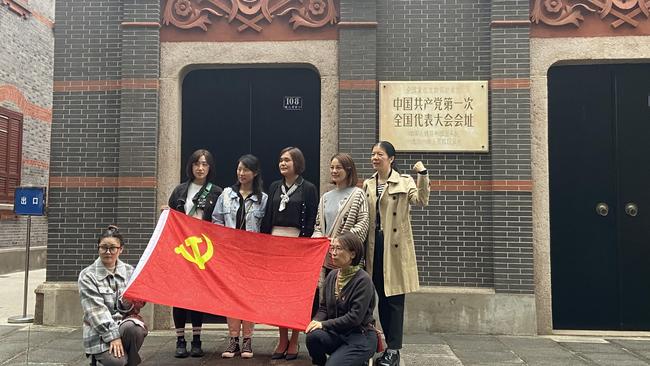
Stirring stuff at the site of the First National Congress of the Chinese Communist Party in Shanghai pic.twitter.com/1ftNJCOBwH
— Will Glasgow (@wmdglasgow) November 10, 2023
If only their future were determined by China’s people. For all the trauma of our recent history, brand Australia still stands tall in the world’s second biggest economy.
Late this week in a room in Shanghai where the Chinese Communist Party held its first formal meeting in 1921, I asked the security guard what he thought about Albanese’s visit.
He knew the Prime Minister had been in Shanghai but said he didn’t know much more.
However, this guardian of one of the Communist Party’s most sacred sites had some comforting words that underlined the ongoing sway of supply and demand, even in Karl Marx’s last great hope.
“My granddaughter’s milk powder is from Australia. It’s the best.”


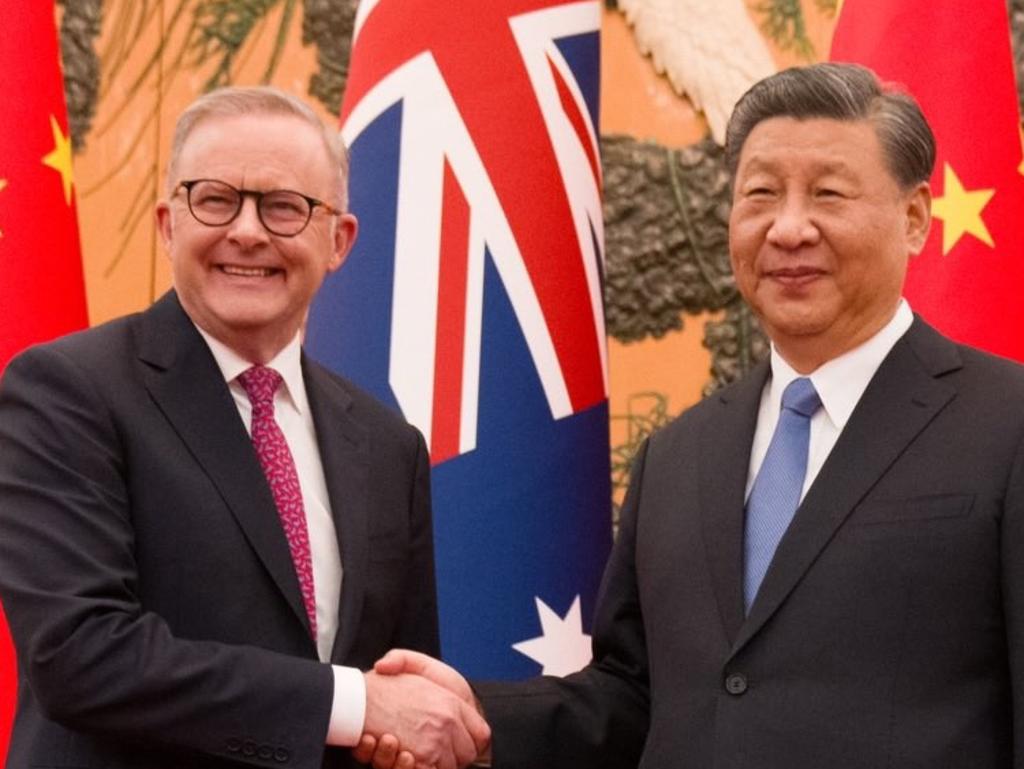

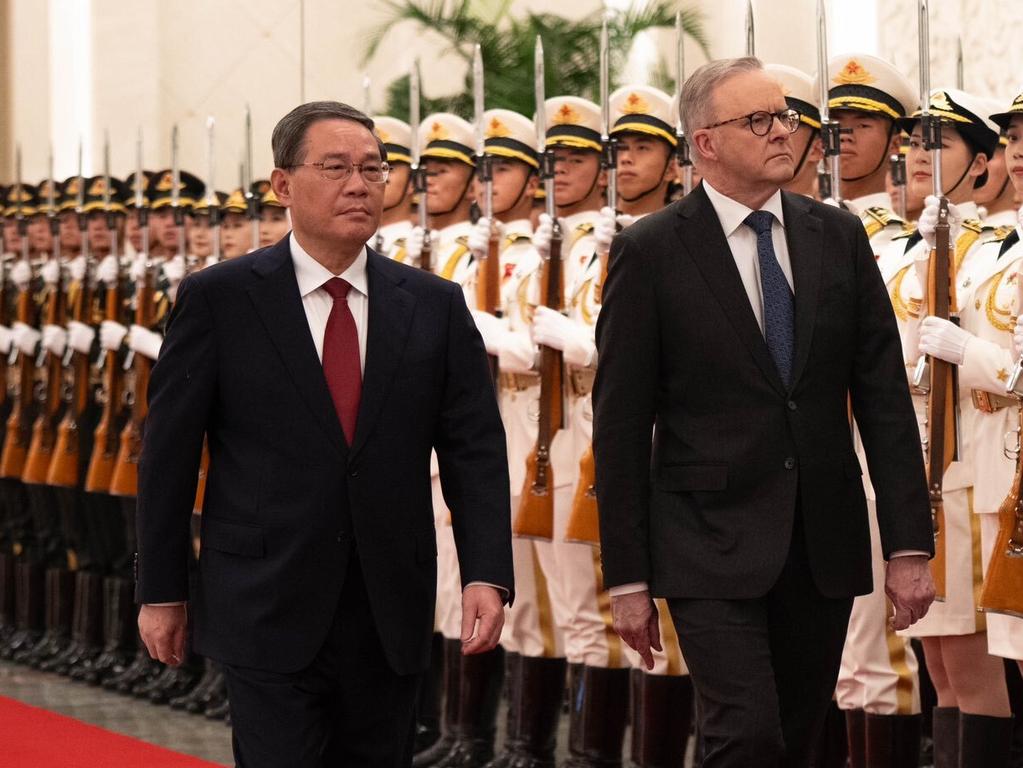

To join the conversation, please log in. Don't have an account? Register
Join the conversation, you are commenting as Logout